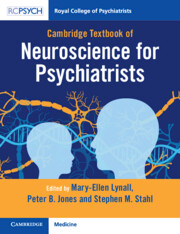Book contents
- Cambridge Textbook Of Neuroscience for Psychiatrists
- Reviews
- Cambridge Textbook of Neuroscience for Psychiatrists
- Copyright page
- Contents
- Contributors
- Introduction
- 1 Cells
- 2 Neurotransmitters and Receptors
- 3 Basic Techniques in Neuroscience
- 4 Neuroanatomy
- 5 Neural Circuits
- 6 Modulators
- 7 Genetics
- 8 Neurodevelopment and Neuroplasticity
- 9 Integrated Neurobiology of Specific Syndromes and Treatments
- 9.1 Autism
- 9.2 Attention Deficit Hyperactivity Disorder
- 9.3 Drug Use, Addiction, Tolerance, Withdrawal and Relapse
- 9.4 Anxiety Disorders
- 9.5 Post-Traumatic Stress Disorder
- 9.6 Obsessive–Compulsive and Related Disorders
- 9.7 Major Depressive Disorder
- 9.8 Bipolar Affective Disorder
- 9.9 Psychosis
- 9.10 Schizophrenia
- 9.11 Borderline Personality Disorder
- 9.12 Self-Harm and Suicidality
- 9.13 Medically Unexplained Symptoms
- 9.14 Delirium
- 9.15 Perinatal Disorders
- 9.16 Sleep Disorders
- 9.17 Eating Disorders
- 9.18 Epilepsy and Seizures
- 9.19 Electroconvulsive Therapy
- 9.20 Brain Stimulation
- 10 Neurodegeneration
- Index
- References
9.16 - Sleep Disorders
from 9 - Integrated Neurobiology of Specific Syndromes and Treatments
Published online by Cambridge University Press: 08 November 2023
- Cambridge Textbook Of Neuroscience for Psychiatrists
- Reviews
- Cambridge Textbook of Neuroscience for Psychiatrists
- Copyright page
- Contents
- Contributors
- Introduction
- 1 Cells
- 2 Neurotransmitters and Receptors
- 3 Basic Techniques in Neuroscience
- 4 Neuroanatomy
- 5 Neural Circuits
- 6 Modulators
- 7 Genetics
- 8 Neurodevelopment and Neuroplasticity
- 9 Integrated Neurobiology of Specific Syndromes and Treatments
- 9.1 Autism
- 9.2 Attention Deficit Hyperactivity Disorder
- 9.3 Drug Use, Addiction, Tolerance, Withdrawal and Relapse
- 9.4 Anxiety Disorders
- 9.5 Post-Traumatic Stress Disorder
- 9.6 Obsessive–Compulsive and Related Disorders
- 9.7 Major Depressive Disorder
- 9.8 Bipolar Affective Disorder
- 9.9 Psychosis
- 9.10 Schizophrenia
- 9.11 Borderline Personality Disorder
- 9.12 Self-Harm and Suicidality
- 9.13 Medically Unexplained Symptoms
- 9.14 Delirium
- 9.15 Perinatal Disorders
- 9.16 Sleep Disorders
- 9.17 Eating Disorders
- 9.18 Epilepsy and Seizures
- 9.19 Electroconvulsive Therapy
- 9.20 Brain Stimulation
- 10 Neurodegeneration
- Index
- References
Summary
Sleep disorders can be understood as conditions which either affect the quality, duration or timing of sleep, or present with unusual sleep-related behaviours. These are often associated with an impact on daytime functioning. In this section we look at the main groups of sleep disorders, followed by a review of the role of sleep in psychiatric conditions and the effect of psychotropic medication on sleep.
- Type
- Chapter
- Information
- Cambridge Textbook of Neuroscience for Psychiatrists , pp. 517 - 528Publisher: Cambridge University PressPrint publication year: 2023



